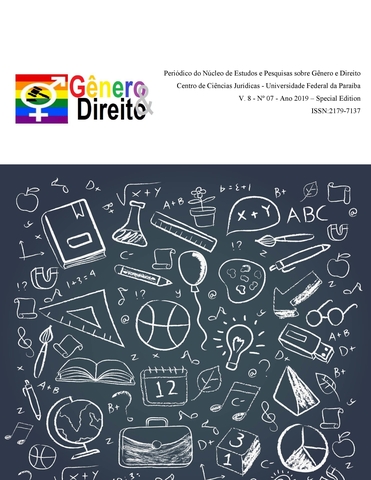TECHNOLOGY OF FORMATION OF STUDENTS’ MOTIVATIONAL WILLINGNESS FOR PROFESSIONAL ACTIVITY
DOI:
https://doi.org/10.22478/ufpb.2179-7137.2019v8n7.50077Palavras-chave:
future specialist, motivation, professional readiness, professional activity, profession.Resumo
The process of formation of the professional personality begins from the moment of choosing a profession and lasts throughout the professional life of a person, during which the most important problems of the relationship between a person and a profession are revealed. In psychology and pedagogy of Western countries, the problem of incentives to activity is revealed in a number of concepts and theories from different positions. Currently, motivation as a mental phenomenon is interpreted in different ways. The main theories of motivation should be divided into two directions: substantive theories, which consider motivation from structural positions, and procedural theories, which consider motivation as a dynamic formation. What unites these areas is the understanding of motivation as secondary to the motive of education. The concept of “willingness” for activity is considered as an active and effective state of the person, the installation to determine behavior, mobilization of forces to perform the task. In the structure of professional willingness of the individual, researchers identify different components, among which the most important is the motivational one –attitude to the profession, the need to solve successfully the task and interest in the activity. An essential component of professional willingness is psychological willingness, which should be considered as a complex functional-psychological and personal formation, including: a positive attitude to a particular type of activity; adequate character traits and temperament to the requirements of the activity; the necessary knowledge, skills, abilities, and habits; stable professionally important features of cognitive and emotional-volitional processes.
Downloads
Referências
Abuzjarova M.I. (2018). Tendencies, law of development and economic content of innovative entrepreneurship. Modern Economy Success. Issue. 1. P. 43-50.
Ashmarov I.A. (2018). Some approaches to the study of the USSR’ military economy in the soviet and russian national historiography. Historical Bulletin. Vol. 1. Issue 2. P. 19 – 31.
Aminova D. K., Tsakhaeva A. A. (2018). Effective preparation of the future psychologist as one of the elements of the security education system. International Journal of Medicine and Psychology. Vol. 1. Issue 3. P. 40 – 47.
Badakhovа I.T. (2017). Formation of professionally significant qualities of future managers in the training process forming. Modern Scientist. Issue 7. P. 81 – 84.
Bolotin I.S., Mikhaylov A.A., Sorokina N.D. (2017). Functional literacy of students in terms of introduction of information technologies (on the example of research among the students of MAI). Modern Scientist. Vol. 1. Issue 1. P. 160–163.
Borisov V.I. (2018). Influence of the food crisis for the revolution of the working mass of russia in the years of the first world war (August 1914 - February 1917). Historical Bulletin. Vol. 1. Issue 2. P. 49 – 55.
Borisova I.V., Novoseltseva V.N. (2016). Structure features of intelligence of students of different types classe. Modern Science Success. Volume 3. Issue 2. P. 124 – 130.
Borisova M.V., Musokhranov A.Yu., Sidorova N.A. (2018). Use of fitness directions elements on physical education classes and their psychomatic impact on students of the special medical group. Modern Scientist. Issue 1. P. 6 – 9.
Borovikova T.V. (2017). Methodological bases of formation of the intellectual potential of territories in the conditions of innovative economy. Modern Economy Success. Issue 6. P. 46 – 49.
Gadzaov A.F., Dzerzhinskaya M.R. (2018). Mathematical methods of analysis of the periodic components of economic processes. Modern Economy Success. Issue 1. P. 14 – 18.
Gadzhieva U.B. (2018). Socialization of personality as a factor in the mental, intellectual and spiritual-moral development. International Journal of Medicine and Psychology. Vol. 1. Issue 2. P. 17 – 20.
Gasanova P.G., Daudova D.M, Kabieva R.A., Tsahaeva A.A. (2017). Moral qualities of businessmen in public con-sciousness. Modern Scientist. Vol. 1. Issue 1. P. 209 – 211.
Gnatyuk S.N., Pekert N.А. (2018). Education as a factor of sustainable development of agriculture. Russian Economic Bulletin. Vol. 1. Issue 3. P. 18 – 27.
Ilkevich T.G., Medvedkova N.I. (2017). Sports and recreational activities in the art university as a means of prima-ry prevention of occupational diseases of students –artists. Modern Science Success. Vol. 2. Issue 4. P. 29 – 33.
Kryuchkova K.S. (2018) Modular training of future teachers with the use of information technologies in the conditions of virtual academic mobility. Modern Humanities Success. Issue 4. P. 9 – 14.
Kuznetsov A.A., Ignatyeva T.A., Kuznetsov A.O. (2018). Strategy and key elements of competitiveness. Modern Economy Success. Issue 1. P. 25 – 29.
Morozov I.D., Sapozhnick P.A., Pavlov S.M., Rodionova I.P. (2018). Tolerant approach in intercultural communication of students youth. Success Modern Sciences and Education. Issue 1. Р. 34 – 36.
Narkevich, L.V., Narkevich, E.A. (2018). Financial condition analysis in the crisis management system. Russian Economic Bulletin. Vol. 1. Issue 4. P. 10 – 24.
Osipova M.B. (2018). Tendencies of development of educational practice of the modern educational organizations. Modern Humanities Success. Issue 1. P. 10 – 13.
Popov V.P. (2018). Methodological aspects of teaching economic disciplines in a multi-level system of education. Modern Humanities Success. Issue 3. P. 10 – 16.
Schwarzkopf N.V. (2018). Improving the use of data mining technology as a way of reducing credit risk. Russian Economic Bulletin. Vol. 1. Issue 1. P. 10 – 18.
Sergeevа M.G., Trubakova D.I. (2017). Teacher’s Reflection Formation as Factor of Effectiveness Children’s Social Intelligence Forming. Modern Scientist. Issue 7. P. 62 – 64.
Tsahaeva A.A., Aminov U.K., Aminova D.K. (2017). Driving forces of the development of adaptive behavior of personality: methodological considerations. Modern Scientist. Issue 8. P. 44 – 47.
Tsahaeva A.A., Aminova D.K., Aminov U.K. (2016). Patternsize value of the constructs of personality as a subject of scientific reflection. Success of Modern Science and Education. Volume 3. Issue 4. P. 16 – 20.
Zulaeva Ts. A., Maslova S.V., Appaeva Ya.B. (2018). Adaptation of students in the process of continuous educational activity. Success of Modern Sciences and Education. Issue 1. Р. 5 – 9

